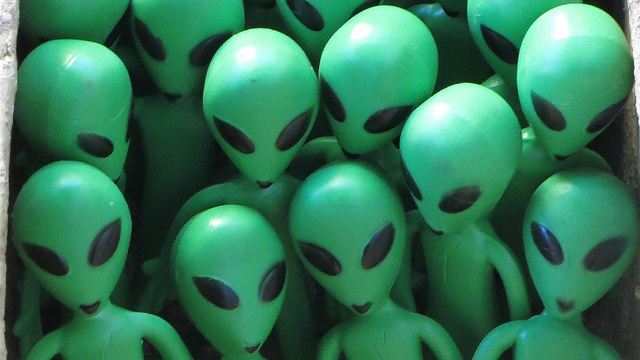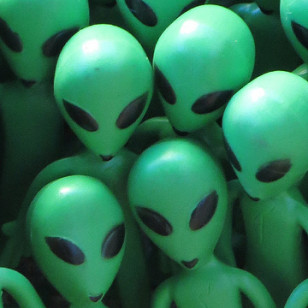Dutch Scientist assures that An Alien Invasion is Unlikely
Should we be fearful of an invasion by Aliens? Probably not any time soon, according to researchers involved in scanning the skies for signs of extraterrestrial life.
Professor Michael Garrett, from the University of Leiden and the General and Scientific Director of the Netherlands Institute for Radio Astronomy (ASTRON) is one of the scientists who conducted numerous radio observations over the years.
Based on his radio scans of the best candidate galaxies (those that held promise of hosting ETI) Garrett has determined that advanced ET civilizations are rare or are not present within the surveyed range of the universe. He says that natural astrophysical processes are most likely behind the detection of any odd radio signals that had been received so far.
“In my view, it means we can all sleep safely in our beds tonight – an alien invasion doesn’t seem at all likely,” said Garrett.
Researchers find that Love is Rooted in Evolution
Humans aren’t the only species who are choosy when selecting mates.
A research team from Germany’s Max Planck Institute for Ornithology recently conducted an experiment that found the Zebra Finch is also pretty fussy too, and for good reason: survival of its species.
For their experiment, the researchers had groups of 20 female Zebra Finches freely select their choice of mates from 20 males.
Once the birds had paired up, half of the zebra finch couples where allowed to go their own way, produce baby birds and live happily ever after.
For the remaining half, the researchers stepped in and broke up the couples. The birds were forced to pair up and mate with a different companion, one who was just as heartbroken.
The researchers found that the happy, self-selected zebra finch couples produced significantly more chicks than the birds in the forced pairings.

On Sept. 15, NASA astronaut Scott Kelly (L) and Russian cosmonaut Mikhail Kornienko (R) reached the halfway point of the first one-year mission to the International Space Station. (NASA)
ISS One-Year Mission Marks Halfway Point
Today (9/15/15) marks the halfway point of the one-year mission being conducted on the International Space Station.
NASA astronaut Scott Kelly and Russian cosmonaut Mikhail Kornienko have been up in the space station since March and aren’t scheduled to return to Earth until the spring of 2016 when their Soyuz spacecraft will land in Kazakhstan.
Typically, an ISS expedition lasts between four and six months.
The One-Year Mission was developed to gain an understanding of the effects of extended spaceflight on the human body.
Knowing this is quite important to NASA’s plans of sending humans deeper into space, such as manned flights to and from Mars.
NASA says that research conducted over the year in space may also benefit humans here on Earth. For example, scientists and doctors can learn to better assist patients who’ve been confined to bed for long periods of time and could allow for the development of improved monitoring systems for those whose bodies have difficulty fighting infections.
Scott Kelly’s twin brother Mark was also a NASA Astronaut who flew on four Space Shuttle missions. Throughout the One-Year Mission both Scott and his Earth bound brother, Mark, are being medically tested and monitored. The results of each twin’s tests will later be compared to another.
Smokers Have Higher Risk of Losing Teeth
There are lots of good reasons to quit smoking. Here’s another one: Keep smoking, and you’ll have higher risk of losing your teeth.
A new study just published in Journal of Dental Research shows that men who smoke are up to 3.6 times more likely than non-smoking guys to lose their teeth.
Among the ladies those who smoke are 2.5 more likely than those who don’t.
According to the study’s lead author Professor Thomas Dietrich, from the UK’s University of Birmingham, most people lose their teeth from either tooth decay or gum disease, which lists smoking as a risk factor.
Smoking can also hide the effects of gum disease so smokers may not realize the seriousness of their oral problems until it’s too late and the teeth start falling out.
And, if you think only old people lose their teeth because of smoking, think again. The study also found that the connection between smoking and tooth loss was stronger among younger people than those who were older.


























The scans for aliens basically involve looking for waste heat output of heavy industry that is on a stellar scale, nothing more nothing less. We’re talking about Kardashev Type III civilizations that have the engineering ability to enclose an entire star, similar to our sun, in a shell that would capture all of it’s radiated energy, and produce lots of mid-range Infra-red waste heat. Which is detectable by IR telescopes. These giant enclosed stars are known as Dyson spheres, and are entirely theoretical, and probably astoundingly hard to create in the first place.
Actually if you ran into a civilization that operated at this scale, we would be an ant on the floor compared to them, of entirely no concern or importance, including our planet, and our solar system. Presuming they are at least as altruistic as we are, they’ll just ignore us and do no harm.
Anyway this scan only looks for Dyson Spheres. It can miss nearly anything else. Including a trillion ton swarm of Von Neumann machine assemblers slowly making their way from solar system to solar system, making copies of themselves from resources, then moving on. Which is disturbingly 10,000x more likely than seeing Dyson spheres, and not really much further than 200 years away with our current technical development. We’re much more likely to bump or be bumped into by these.
Thank God I stopped smoking more than fifteen years. My visit to a hypnotist in New York was my final step. Coupled with the money I was charged (over $900) for three sessions, I made up my mind finally when I was at the hypnotist office. I threw my lighter and a packet of Malboro cigarette in a dumpster very close to my car. There and then I said no more and that was it after I had smoked for over thirty years. If I can stop it anybody can because I tried dozens of times without success. I bought the whole set of patches from stage one to four only not to use them whilst I was in Canada. In New York I asked my primary physician to prescribe a medication and he prescribed Zyban. I paid for them but did not take any. It was not the hypnotism that did the trick though in some part it did. I said to myself that if I went back to smoking, my $900 would have gone into smoke. Secondly I was given two cassettes describing the ills of smoking. I shut off all stations on my way to Washington DC every weekend from New Yor and back. I listened to these tapes over and over again. I also continued doing the same things I did when I used to smoke, I drank my wine and tea without smoking. It also became unbearable for me to stand in the snow just to smoke. Also my clothes in the closet were smoke infected always. Also I said to myself that I will not allow a government to balance its budget on the backs of smokers including me. Apart from losing ones teeth thank God I have not one could also have some breathing problems which I have though not as serious as others I see with oxygen tanks. So folks this is my story and it is never too late to stop it.
Your web site won’t render appropriately on my apple iphone – you might wanna try and repair that
Thanks so much for bringing this to our attention! – I’ll pass this along to the IT staffers responsible for this.
I love your wp template, where did you get a hold of it through?